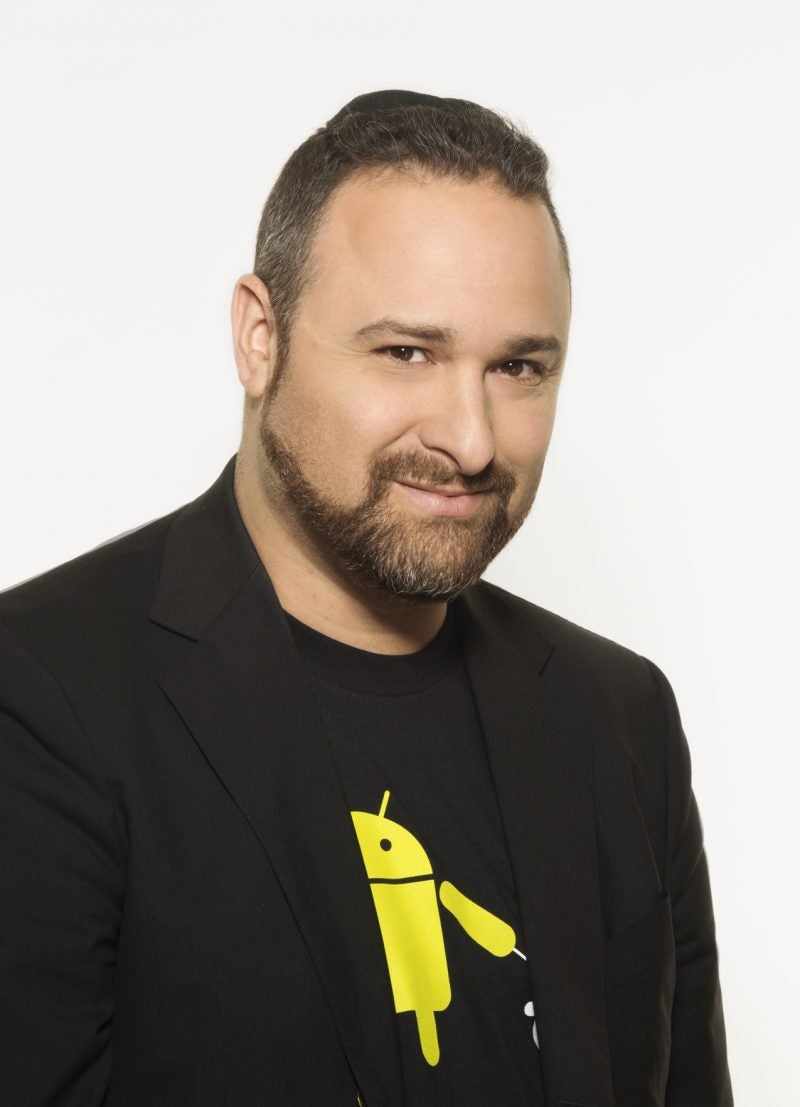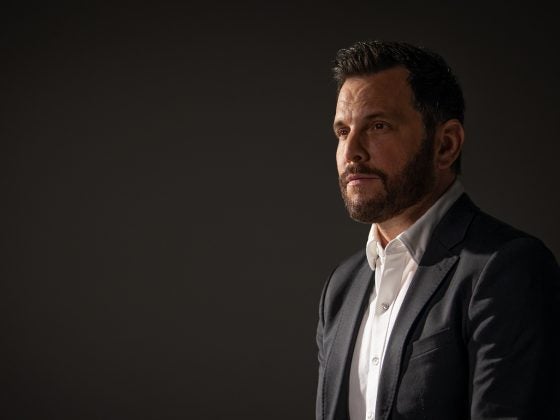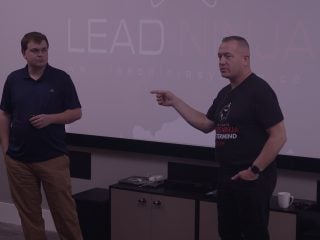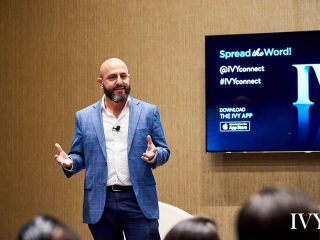It’s not an exaggeration to say that Hillel Fuld’s work is known amongst the leaders of some of the largest tech companies in the world.
Named “the man transforming Startup Nation to Scale up Nation” by Forbes, he is an Israeli tech journalist, startup marketer, and technology expert.
Working with technology companies, he accompanies them from idea to revenue. He also works with many leading tech brands as an influencer, including Google, Oracle, Huawei, and many more.
His written work has been featured in CNBC, Inc Magazine, Fast Company, Entrepreneur Magazine, TechCrunch, The Next Web, and various other leading tech publications. He’s also a popular and influential tech blogger.
Hillel also speaks publicly on a long list of topics, including marketing, entrepreneurship, Israeli tech, and his business philosophy. Learn more from his website, his tech vlog, and podcast that cover tech news in general, and Israeli innovation in particular.
Swagger brings this in-depth interview from a man who has used his extensive network to help hundreds of people land jobs in the tech ecosystem.
What did you envision that you’d be doing as a career before you entered into this current career?
I had absolutely no idea how I was going to get into tech, but it was clear I was going to work in tech because I was obsessed. I found my first job as a technical writer. A technical writer writes the user guides you get with your iPhone, that no one ever reads. That was my first job. Very boring.
At the time, I was like ‘why am I doing this?’ In retrospect, that was the biggest gift. First of all, as a technical writer, you have to sit with engineers and take their engineer language, and translate it into normal language. At the time, I was like ‘what am I ever going to do with this skill?’ but that’s what I do now as a blogger. That’s one. Two, I was laid off from that job, and was traumatized. But in retrospect, had I not been laid off, none of this would have happened. Some perspective on life.
I’m sitting at my desk one day – 14 years ago – my first blog post. I had some thoughts on tech and wrote them. I didn’t have a business model. Blog wasn’t a word people knew. It was really more like a diary for me. Really quickly entrepreneurs started to reach out: ‘I read your article. I’d love to meet you.’ I realized that as good as these guys are at building tech, they are equally bad at building a business. They had no ability to communicate what they do, or do market research. I’d sit with these guys and help them for free over lunch.
What ended up happening over the next 14 years, is tens of entrepreneurs started coming back to me and said, ‘We know what you did for us early on. What are your terms?’ What ended up happening was that I built myself a venture capital fund without capital. I have this portfolio of companies that come back to me, and I work with them on growth. I envisioned none of this, because it wasn’t a thing.
What is your point of differentiation?
I’ve seen – rough estimate – three thousand startups over the years. As someone who meets a lot of entrepreneurs, I notice a lot of patterns. Another differentiator is that I’ve never come to a company and said, ‘pay me’. Every time I have a meeting with an entrepreneur I say, ‘what are your challenges?’ You need press? I write for the press. I’m happy to connect you. If I connect you to a journalist, the journalist is happy. He has a story. The company is happy, they get good press. They need an introduction to an investor? Happy to help you. 99% of the problems a company has, I can solve in a matter of minutes, not because I’m a rock star, but because I’ve built this network over the years.
Today, 99% of what I do with startups don’t require time. Time is not my product. I can connect him to a top-tier investor in Silicon Valley, because I’ve cultivated that relationship over many years. I can help a start-up; it doesn’t cost me anything. If I can help them, why not?
Again, I didn’t plan for this, but it’s the best business model in the world. If you think about it, everyone else is taking everything on credit. You are paying people to do things in the future. Let me just do – then you realize how much you need me. Then I define the terms.
How would you describe what you do in twenty words or less?
The Hillel Menu: I build the strategy for social media, content, PR, leverage my network, business advisor, and fundraising.
When you meet entrepreneurs, what tends to be the most frequent or biggest mistake you see?
There are standards mistakes I see many entrepreneurs make. Disclaimer: I blame myself, and the market for this. We glorify tech. Everyone’s a tech entrepreneur, because he wrote down a tech idea on a napkin. We glorify the $100K acquisitions, and it’s all we talk about. Then people take this idea and run with it, thinking they are going to achieve that greatness, and they don’t realize that 95% of startups fail.
They don’t do competitive analysis, market research. If you don’t know what the market says, who’s tried this before, you are going to fail. Since 95% of startups fail, if you don’t do market research, there is a 100% chance you will fail. I’m not saying that if you do the research, and you realize there are a million companies doing what you do – not to do it. But at least you aren’t shooting into the dark. You know what is going on. That’s something I find entrepreneurs skip over – just running with the idea without market research.
Another thing, this stems from the lack of research. They don’t really understand their home run. Every startup needs a home run. Something that when you come to an investor to do this deal, and they feel FOMO – fear of missing out – they open their check book. You need to create FOMO. If you have just an okay product in an okay market, I’m not taking out my check book.
How does Hillel define great leadership?
If I have to choose one characteristic that makes a great leader, it would be resilience. Again, we glorify the successes, the wins. We don’t know what went on before that. There has never been a startup in the history of mankind that didn’t go through a roller coaster – that didn’t have days they were close to shutting down. Good entrepreneurs have the ability on those days to come back.
Here’s your answer. What do all great leaders I’ve found in my life have in common? Humility. Every single one of them. It’s an interesting concept. You’d think there would be a correlation between success and their ego. For a person who has a lot of success, I wouldn’t blame them for their ego. But it’s actually an inverse correlation.
The greatest leader was humble Moses…?
Moses. The only thing we know about Moses is that he was humble, and had a speech impediment. It’s an interesting point to mention Moses. Because if I was going to think about a leader to take these people out of slavery, that profile would be a charismatic, good-looking guy. Moses was the opposite of that. He was a simple dude. But great leaders have humility. In the business sector, they succeed when there is tremendous humility.
Your best story about failure?
People learn from failures. I know it’s cliché, but it’s true. Things become cliché because they are true. If you make a mistake and you learn from that mistake, then it’s not a failure. Yeah, the company might have shut down, but that’s not a failure. You’ve taken something to leverage in your next rodeo. This has happened to me countless times. Like launching companies too early, or there was an amazing staff and team but the product wasn’t there. There are many examples of things I’ve learned from. There is a famous story I love, that I quote five times a week.
Everyone knows Reddit. In the beginning, there was another company that was Reddit’s direct competitor called Digg. Very popular, but Reddit won. When they asked Kevin Rose, who was the founder of Digg, ‘what was your biggest mistake? Why did you lose?’ he said something very fascinating and profound. ‘My biggest mistake was that I hired my team for skills, and not for talent.’ He hired a developer who could write a certain type of code. When that code became obsolete, that person became obsolete, because they weren’t talented. They were just skilled people. I’ve gotten hundreds of people jobs with that pitch.
I had a CEO reach out to me one time. He said, ‘I need someone to manage my marketing.’ I said, ‘Listen, I could send you to a guy who has done this before. He’s great. Or, I could send you to a guy who has not done this before, but he’s very talented, fast learning, hard worker and will give it 200%.’ The CEO said ‘with that kind of endorsement, I’ll hire him.’ Without interviewing him. And the guy ended up running the company. This is a perfect example. Kevin Rose failed, but he learned from his next rodeo. You can acquire skills but you can’t acquire talent.
An idea of where you think tech is going?
I had the incredible opportunity to ride in a fully autonomous car. I don’t mean a Tesla or my Volvo, which drives itself on the highway. I’m talking about a fully autonomous – merging into Israeli traffic. I’ve never felt more like I was living in the future than that day. So, autonomous cars we know will completely transform our lives. You don’t need to be a tech expert to know that’s exciting.
To me, though, I’m most excited about drones. It’s a flying computer. This is a device that you can hold in the palm of your hand and it can fly miles and record in 4 or 5K, and has 19 GPS satellites that communicate with it at any given moment. It has obstacle avoidance in all directions. It is remarkable technology, and you can just walk into a store and buy it now. I’m not a regulation guy, but it actually boggles my mind that there is not more regulation around drones.
Like any tech it can be abused, but if used for positive things, is going to fundamentally transform our lives. The leading drone delivery company is Israeli, called Flightrex. The CEO was previously the CEO of Space IL. Drones are going to completely change our lives. From groceries, to medical supplies, to evacuating victims of war.
But to me, the most exciting thing that I’m deeply passionate about is human to computer interaction.
If you think about the fact that in 2023, we are even using a mouse is preposterous. A mouse is the most ridiculous, primitive technology. You are clicking on a click wheel. So, now we have these smart phones and we think we have these super computers in our pockets. Our kids and grandkids are going to look back and say, ‘You’re telling me that you walked around the street with a slab of glass in your face?! That’s objectively primitive behavior.’ So, the way we are going to interact with our computers and devices is going to fundamentally change over the next 5-10 years and every single consumer electronics company is building glasses. I can tell you that we won’t be using a mouse or a smart phone within the next decade.
What we know about VR today is that you put a headset on and you don’t see the world. Then there is AR, Augmented Reality – which is you see the world and you can augment another layer on top of it. But there’s a third one which is MR – Mixed Reality. That is the technology that I think most blew my mind. I walked into a four feet by four feet room and put on a headset made by Magic Leap, and the guy who was doing the demo says to me, ‘Go to that table and lay down dominoes.’ So, I walk over to the table and I lay down dominoes. Then he says, ‘okay go knock down that domino.’ I do it, they all fall down like naturally. Then he says, ‘Take off your glasses.’ I take off the glasses and there’s no table. Nothing. The whole thing was fake. In the first demos of this technology, you’d hold out your hand and they’d put a virtual character on your hand that you could engage with. It’s mind bending.
The practical applications for that are endless. A surgeon could get a hologram of a heart to practice on. Emergency situations, gaming, entertainment, there are a million things it could be used for.
So, the way we will interact with our computers will completely change. Whether it’s the Microsoft Hololens, which is swiping in the air … Google Glass, which is a decade old – that was pretty unbelievable. Based on movements of your head, it would interact with the hologram on your glasses. We know that cars have a heads-up display on the windshield.
I don’t know what format will win, but just look at history. What company, when they release a product, doesn’t go mainstream? There is only one company. When Apple releases a product it’s game over.
What are the best keys for networking?
I think the fundamental, foundational concept at succeeding in networking is helping others win.
Whereas, most companies they are like, ‘I am going to promote myself.’ No one is interested in following a company that talks about themselves all day long. Everyone you sit with, think about how you can help them, verses how they can help you. And it’s somewhat counterintuitive. How I gain if I help someone else? Number one, you know how to overcome their problems, because you’re always solving problems. Number two, you’ve strengthened the relationship, because they trust you. Number three, you built up a reputation of being indispensable right? And now, a bank of favors to call up down the road.




















